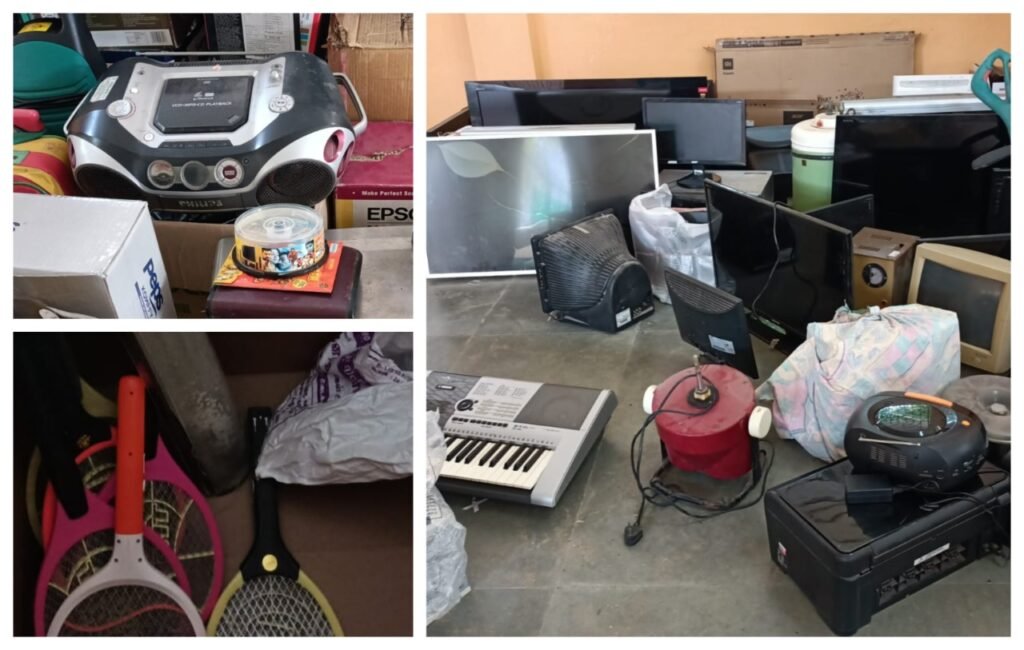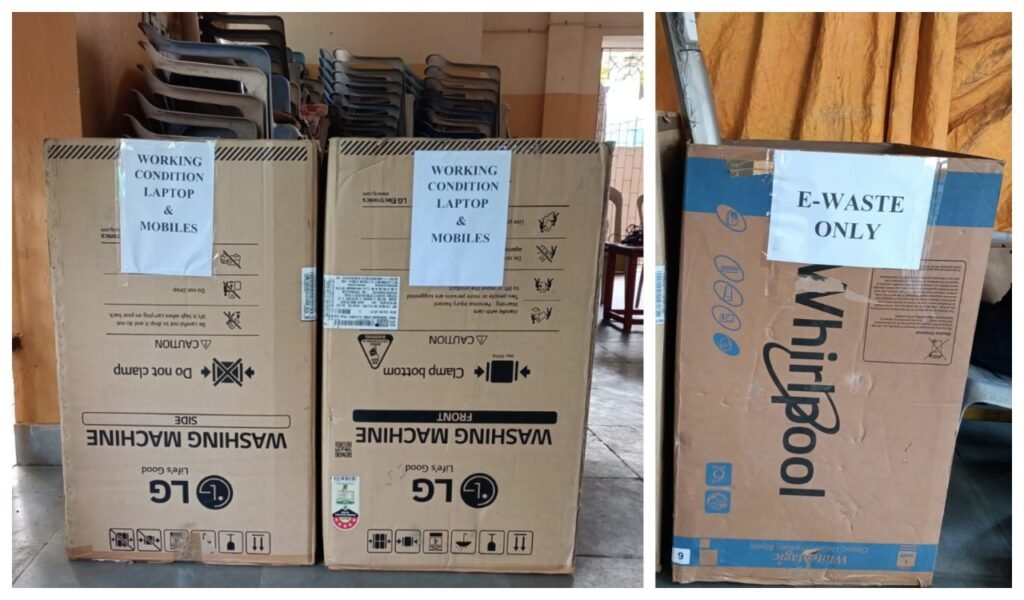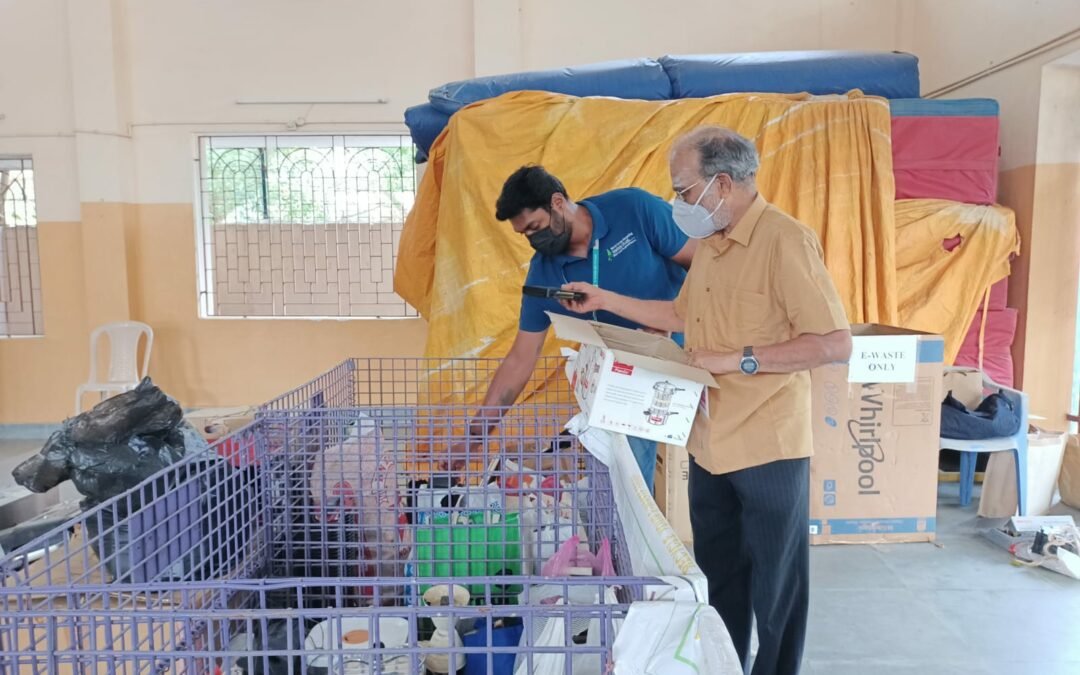Read in : தமிழ்
Chennai with its hundreds of tech companies generates tonnes of e-waste every year. Now, with several electric vehicle manufacturing companies setting up shop on the outskirts of the city, the e-waste being generated is only going to multiply. Yet, there is no concerted government-driven effort to collect and dispose of waste generated from electronic products.
A few days ago, Residents of Kasturba Nagar Association (ROKA), conducted a drive to collect e-waste from homes. Between February 11 and 13, ROKA collected as much as 5,611.32 kilograms of e-waste. They collected 4.3 tonnes of such waste from Adyar’s Gandhi Nagar alone. Last year, ROKA collected as much as 2 tonnes of e-waste.
The residents’ association has been actively involved in collecting e-waste from residents of Chennai since 2019 and frequently conducts camps to collect e-waste. They can be contacted via Whatsapp on 9941483839. They also have a Facebook page.
Electronic items contain heavy metals such as copper, iron, mercury, lead, lithium and barium. When they are dumped in trash sites, the heavy metals leach into the earth and contaminate the groundwater. When they are burnt without regulations, they emit toxic gases into the air. Heavy metals are dangerous contaminants that could affect air, water and soil quality. So, it is important we deal with them carefully — Professor Khushbu K Birwat, Global Academy of Technology, Bengaluru
What exactly is e-waste?
All waste from electronic gadgets and electrical appliances that are no longer usable is considered e-waste. The United States’ Environmental Protection Agency has classified electronic waste into 10 categories:
- Large household appliances, including cooling and freezing appliances
- Small household appliances
- IT equipment, including monitors
- Consumer electronics, including televisions
- Lamps and luminaires
- Toys
- Tools
- Medical devices
- Monitoring and control instruments and
- Automatic dispensers
A more technical classification puts e-waste into six different categories:
- Temperature exchange equipment (such as air conditioners, freezers)
- Screens, monitors (TVs, laptops)
- Lamps (LED lamps, for example)
- Large equipment (washing machines, electric stoves)
- Small equipment (microwaves, electric shavers) and
- Small IT and telecommunication equipment (such as mobile phones, printers)
These include batteries of all kinds.

Various kinds of e-waste collected by ROKA. These include music systems, LCD and LED TVs, computer systems, electronic pianos and even mosquito zapper bats.
E-waste is extremely hazardous, don’t put it in trash bins
Professor Khushbu K Birwat from Global Academy of Technology, Bengaluru explains why we should exercise caution while dealing with e-waste. She says we should treat electronic waste like regular trash that we discard in bins.
Electronic items contain heavy metals such as copper, iron, mercury, lead, lithium and barium. “When they are dumped in trash sites, the heavy metals leach into the earth and contaminate the groundwater. When they are burnt without regulations, they emit toxic gases into the air. Heavy metals are dangerous contaminants that could affect air, water and soil quality. So, it is important we deal with them carefully,” says Professor Khushbu.
What happens to collected e-waste?
ROKA sends all the collected e-waste to a Tirupati based company named World Scrap Recycling Solutions Pvt Ltd. The company’s Chennai Branch Senior Manager V Ra Umakhamini says the collected e-waste is shipped to their Tirupati plant for recycling. She says that they collect all e-waste at their Chennai office situated at Ashok Nagar. Residents can contact World Scrap Recycling Solutions at 8838695815 and 9381092900 or contact them through their website www.worldscraprecycling.com.
Another company collecting e-waste in Chennai is Virogreen, which has been functioning in Gummidipoondi since 2005. They not only collect e-waste from households on call, they also pick up the electronic waste generated in bulk from the tech companies in Chennai. Virogreen’s Manager R Jayakumar says one needs a permit from the Union Ministry of Environment, Forest and Climate Change as well as a local license from the City Corporation to process e-waste. They have two processing plants in Chennai and there are 35 small dealers supplying the collected material to them.

The e-waste is sorted and then sent to processing plants, which extract glass, plastic and metal from the electronic items. Whatever is left over is shipped to recycling plants.
Jayakumar says officials from the union ministry visit the plants and inspect the process and machines. The officials also set a ceiling on how much e-waste they can collect and process in a year. Residents trying to dispose of their e-waste can approach Virogreen at 9940831313/044-26512449 or can contact them the website www.virogreen.in.
The public doesn’t have a clue on how to dispose e-waste from households. The civic body should set aside a day in the week to collect e-waste from homes and collect the e-waste through its conservancy workers to ship them to recycling companies. It will ensure that e-waste is discarded scientifically — Sivasubramaniam Jayaraman, civic activist
What should the government do?
Sivasubramaniam Jayaraman, a civic activist, says that Tamil Nadu government should sensitize people about e-waste. The public doesn’t have a clue on how to dispose e-waste from households. The civic body should set aside a day in the week to collect e-waste from homes and collect the e-waste through its conservancy workers to ship them to recycling companies. It will ensure that e-waste is discarded scientifically, he says.
Former professor of Madras Institute of Developmental Studies S Janakarajan says the state government has no clarity on how to handle e-waste. With hundreds of tech companies, Chennai generates a huge volume of e-waste in Tamil Nadu. Another type of e-waste we are accumulating is solar panels. “How are we going to dispose of the solar cells in the panels once they are old and dysfunctional? Similarly, how we are going to address the e-waste that electric vehicles are going to generate?” asks Janakarajan.
Plastic was considered convenient when it was introduced some decades ago. But it has turned into a menace now. Electronic items are a similar menace. “The government should set up an expert committee to deal with this problem. Else, we will turn our planet into a junkyard of e-waste very soon,” he adds.
Read in : தமிழ்











